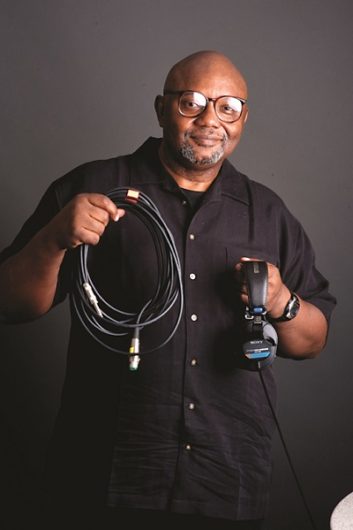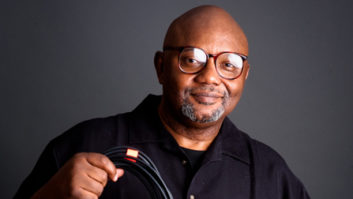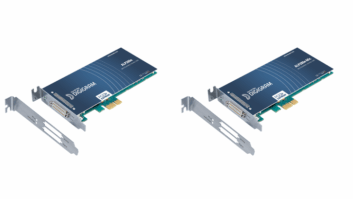 One of the pleasures of my job is introducing you to folks I’ve come to know and respect in our industry. Accomplished people. Good people.
One of the pleasures of my job is introducing you to folks I’ve come to know and respect in our industry. Accomplished people. Good people.
One is David Antoine. Born and raised in the Bedford-Stuyvesant section of Brooklyn, David started out learning audio sound engineering as a working member of the East Cultural and Educational Center in 1969. Soon moving into the world of radio, he worked his way up in engineering circles to become chief engineer of WBGO(FM) in Newark, N.J., and a member of the board of the Association of Public Radio Engineers. He also has done engineering and IT work for WQXR(FM)/WQEW(AM) New York Times Radio; he was sales engineer and tech support engineer for manufacturer AETA Audio and worked as a project engineer for DSI RF Systems, building transmitter rooms and servicing the broadcast community in the New York area.
I asked David to tell me a bit more about himself as part of Radio World’s coverage of successful and interesting engineers in our industry.
Paul McLane: What’s the scope of your responsibilities as chief engineer of WBGO?
David Antoine: As chief engineer for WBGO(FM) 88.3 MHz, it is my responsibility to keep the station on the air and sounding good, maintaining FCC compliance, EAS compliance, and everyday management of the technical plants that make WBGO run. In this digital age additional responsibilities include maintaining the broadcast computer networks and our in-house LAN, which facilitates the staff desktops and laptops, printers, etc.
Our broadcast studios and offices are located in downtown Newark, N.J. WBGO has a primary transmitter site in the heart of Manhattan, at 43rd Street and Broadway in Times Square. Our backup site is our old primary site, which is in downtown Newark.
McLane: You had a big RF project in the past few years; describe that.
Antoine: WBGO is the last remaining full-time jazz music radio station here in the New York tristate area. When we used to broadcast from Newark we got out pretty good, had decent coverage; but we were always lacking in the five boroughs of New York City, where a lot of our core audience and donors lived. When I was hired as chief engineer in 2009, there were plans on the table to move the main transmitter into Manhattan to provide better New York City coverage. I picked up those plans and reworked them, and we signed a lease and built a new transmitter site at the Durst building at 4 Times Square.
It was a fun project for me, as I was shown an empty room on the 51st floor by John Lyons, Durst vice president of communications and broadcast operations, and basically told to have at it. I put on my project manager hat and proceeded to solicit quotes and plans for antenna, transmitters, and the equipment needed to build a state-of-the-art transmitter site. That was early spring 2011.
WBGO went on the air from 4 Times Square in late December 2011. WBGO’s coverage was increased within New York City as planned. We now get better signal penetration in the buildings in Manhattan, whereas before it was really hit and miss where reception of 88.3 MHz was concerned.
McLane: What’s your background and how did you first get involved in audio, recording and radio?
Antoine: My humble beginnings: I grew up in a wood frame house in the Bedford-Stuyvesant section of Brooklyn, N.Y., about half a mile from Pratt Institute. I always had an interest in electronics and technical things. Won a citywide science fair while in the sixth grade at Junior HS 117. My project was a basic telephone transmitter made from parts that I got from Canal Street and the Bell Telephone central office in downtown Brooklyn.
In my mid-teens I took a summer job at a cultural center called The East. The East became a place for locals to go and listen to top-named jazz and Latin jazz artists perform on weekends. It was a family atmosphere, as they did not serve alcohol. So I was able to hang out and work there and learn audio engineering putting microphones in front of people like Max Roach, Betty Carter, Freddie Hubbard, Pharaoh Sanders, Sun Ra & his Orchestra, and other top-named jazz greats.
While working there I was introduced to my mentor and friend “Q.J.” Simpson, who was a local mobile DJ. (No relation to OJ). Q.J. had a big following and had his own DJ equipment which he would haul around in Oldsmobile 98. People would hire him for dances, weddings and any event that required music. At some point he added microphone setups to his system. We began doing small venue shows and concerts. We became sought after by many of the event promoters in New York, as we had a rep for being very professional and knowing what we were doing. And we provided real good sound.
At some point I branched out and wanted to tour. A friend of mine, another mobile DJ named “Plummer,” was working with the Trammps out of Philadelphia. They were getting lots of tour dates and Plummer needed help. I was asked if I was available and began touring with them in the fall of 1977. For the next five years I toured with various bands as a front-of-house audio engineer. Learning and honing my skills as an audio engineer and a technical manager.
Around about 1980, during some down time and a slow touring period, I decided that I wanted to get a steady job. I always had an interest in broadcasting. I signed up for classes at ATS, Announcer Training Studios. They taught a course that prepared you to take the First Class FCC exam. Having an audio background made the course work very easy for me.
I passed all three elements of the FCC exams got my First Class “ticket” at the end of 1980. I began sending out résumés. Thirty to 40 mailings later I was hired as an assistant chief engineer under Richard Koziol for WNCN(FM) 104.3 MHz GAF Broadcasting in New York City. My first job in radio. The rest as they say is history. Thirty-three years to the date.
McLane: Favorite smartphone app?
Antoine: FING gives you a snapshot of the network you’re connected to. Shows all IP addresses current and some that were used by equipment that may be dormant. Next would be Maps … use that every day, practically.
McLane: Your most interesting experience in radio engineering?
Antoine: Setting up for a live interview with Nelson Mandela at Gracie Mansion in New York City during his visit to New York after he was released from prison. I got to meet him, shake hands and take a picture with him.
McLane: Words of wisdom for young people interested in a career in broadcast technology?
Antoine: Walk into a broadcast facility and find the engineer and make him your mentor.
Find out when and where your local SBE chapter meets; visit www.sbe.org under the Chapters tab. Attend the meetings. They are free and they are glad to have you walk in the door.
IT skills are a big help. Cisco training goes a long way. Electrical engineering. Learn the sciences that compliment broadcast engineering.
And while you are at it, learn some people and management skills. Because you will have to interface with your coworkers and if you are responsible you will be given a project and a budget to manage.
Comment on this or any article. Write to [email protected].







